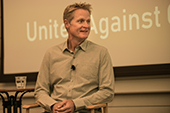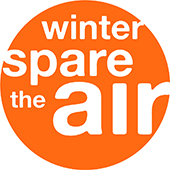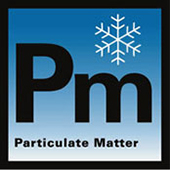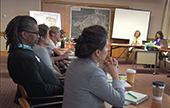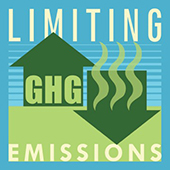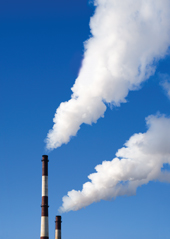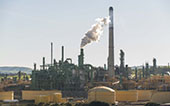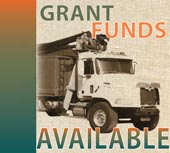|
|

|
|
|
|
November 2018 l Volume 2018-4
|
|
|
|
|
|
|
| | |
Diesel Free by ’33 and Climate Tech Marketplace: The Air District’s Global Climate Action Summit Affiliate Events at the Forefront of Climate Action
|
|
On September 12, the Air District hosted United Against GHGs: Diesel Free by ’33 as part of the Governor’s Global Climate Action Summit. This full-day conference drew over 200 attendees, ranging from local and county government leaders to non-profit organizers and business leaders. The event opened with a keynote conversation with Steve Kerr, Head Coach of the 2018 NBA Champion Golden State Warriors. Kerr stressed the importance of leadership and tackling climate change as a bipartisan public health issue. Tanya Müller García, Secretary of the Environment for Mexico City was the featured closing keynote speaker. Already on the forefront of global action, Tanya Müller García highlighted Mexico City’s efforts to reduce GHG emissions by way of biking, public transit, and other diesel-free methods of transportation. Both conversations were led by Climate One founder and host Greg Dalton, who provided thoughtful questions and an in-depth dialogue about the current and future state of climate action.
The full day’s agenda featured thoughtful discussions from a parade of government, community and business leaders. Oakland Mayor Libby Schaaf, California State Senators Scott Wiener and Ricardo Lara and Santa Clara County Supervisor Dave Cortese discussed necessary steps for reaching diesel-free goals at a local and regional scale. The next panel tackled community health, with Ms. Margaret Gordon of the West Oakland Environmental Indicators Project, Ken Szutu with the Vallejo Citizen Air Monitoring Network and Dr. David Cooke, Head of General Thoracic Surgery of the UC Davis Medical Center, all speaking about diesel impacts in their communities and on individual health. Alyssa Goldfield, an 8th grade student at Lincoln Middle School in Alameda, addressed the group by speaking about the future generation of leadership.
Afternoon panels provided finance and technology options for going diesel-free and featured the following speakers:
- Richard Corey, California Air Resource Board Executive Officer
- Courtney Smith, Chief Deputy Director, California Energy Commission
- Jack Broadbent, Executive Officer, Bay Area Air Quality Management District
- Matthew Nelson, Director of Government Affairs, Electrify America
- Wayne Nastri, Executive Officer, South Coast Air Quality Management District
- Stella Li, President, BYD Motors Inc
- Ray Minjares, Program Lead, International Council on Clean Transportation
- Steve Heminger, Executive Director, Metropolitan Transportation Commission
- Michelle Buffington, Clean Transportation Incentives Manager, California Air Resources Board
- Colin Murphy, Policy Advisor, NextGen America
- Darrell Steinberg, Mayor, City of Sacramento
- Shirlee Zane, Supervisor, Sonoma County
- Gary Dannar, President, Dannar, Inc.
United Against GHGs showcased the Air District’s recent Diesel Free by ’33 initiative with a formal signing ceremony for mayors and industry leaders that have endorsed the Diesel Free by ’33 Statement of Purpose. To date, this Statement of Purpose has been signed by more than 130 representatives from cities, counties, communities and industries throughout the Bay Area and beyond, affirming their collective commitment to drive down diesel pollution by the year 2033. This pledge is still open and signatories continue to sign by going to dieselfree33.baaqmd.gov.
The Air District’s second affiliate event, Climate Tech Marketplace, took place on September 13 and provided an essential follow-up to the previous day’s diesel-free discussion. Held at the Bay Area Metro Center, the networking event showcased emerging climate technologies for the commercial, industrial, and transportation sectors. The event featured over 30 innovative climate technologies and drew over 275 attendees. The Climate Tech Marketplace offered concrete solutions and partnerships for business and government customers alike, providing next steps for those who have committed to the Air District’s Statement of Purpose and paving the way for a diesel-free future.
The Air District garnered widespread appreciation and positive feedback for its two affiliate events. Emails and tweets from a broad range of speakers and attendees praised the event’s organization and content.
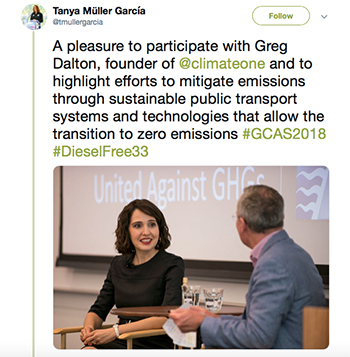
Mexico City Secretary of the Environment Tanya Müller García
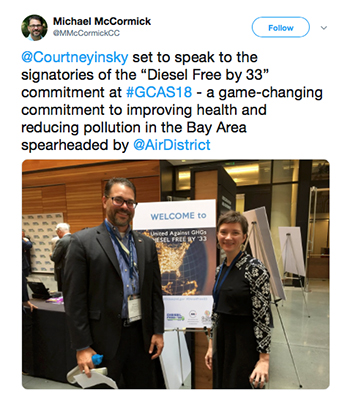
Attendee Michael McCormick, Senior Planner, Governor Brown’s Office of Planning and Research with Speaker Courtney Smith, Chief Deputy Director, California Energy Commission
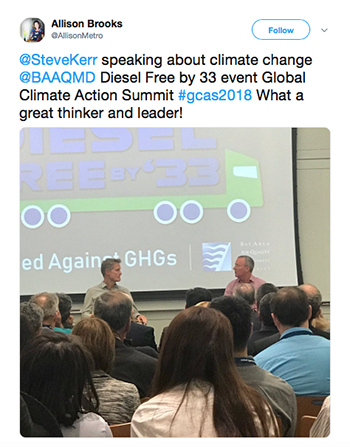
Attendee Allison Brooks, Executive Director of Bay Area Regional Collaborative
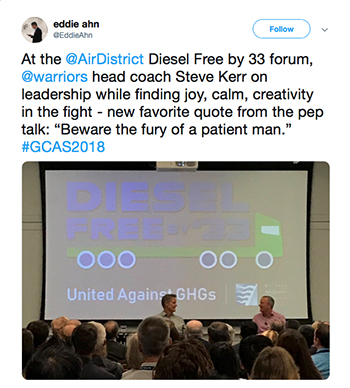
Attendee Eddie Ahn, Executive Director of Brightline Defense, San Francisco Commissioner of the Environment, and Commissioner of the SF Bay Conservation and Development Commission
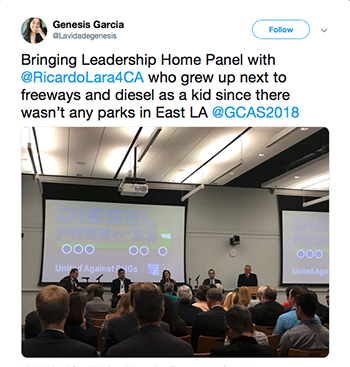
Attendee Genesis Garcia, SF Transit Riders Board Member and Staffer for California Assemblyman David Chiu
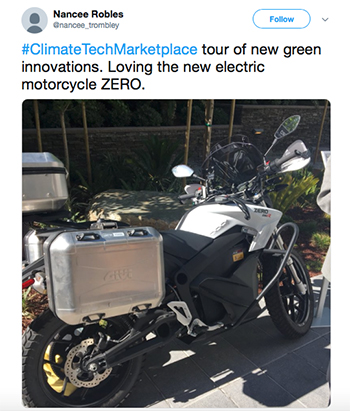
Climate Tech Marketplace attendee Nancee Trombley, Chief Deputy Executive Director of the California Infrastructure Bank
|
|
|
|
|
|
|
|
|
|
|
|
|
|
| | |
Winter Spare the Air Season Starts November 1
|
|
The 2018-2019 Winter Spare the Air season begins Thursday, November 1.
Just like the wildfire smoke that has impacted the Bay Area this year, wood smoke is harmful to breathe. Winter weather conditions trap smoke from household wood burning around homes and allow fine particle pollution to build up inside and outside of our residences. During the Winter Spare the Air season, from November 1 through February 28, the Air District calls Winter Spare the Air Alerts when air quality is forecast to be unhealthy. Poor air quality in the winter is due to fine particulate pollution, primarily in the form of wood smoke. When an alert is in effect, it is illegal to burn wood, manufactured fire logs or any other solid fuel, both indoors and outdoors in the Bay Area, for a full 24 hours.
Natural gas, propane or electric fireplaces do not release unhealthy smoke into the air and can be used during Winter Spare the Air Alerts.
Cold temperatures and calm winds during the winter season allow wood smoke to build up in the region, creating unhealthy air quality in Bay Area neighborhoods. The Air District calls a Winter Spare the Air Alert for the next full calendar day when weather conditions are forecast to trap pollution close to the ground.
The Air District may call Winter Spare the Air Alerts up to three days in advance to keep air pollution from building up and exceeding federal standards. During an alert, the use of wood-burning devices such as fireplaces, pellet stoves, wood stoves and outdoor fire pits is prohibited. In San Francisco, the National Park Service also prohibits recreational beach fires at Ocean Beach in Golden Gate National Recreation Area through the end of February.
Bay Area residents can find out if a Winter Spare the Air Alert is in effect by:
- Signing up for text alerts! It’s easy - to sign up, text the word “START” to the number 817-57
- Calling 1-877-4NO-BURN
- Visiting www.sparetheair.org or www.baaqmd.gov
- Signing up for automatic e-mail AirAlerts at www.sparetheair.org
- Signing up for automatic phone alerts by calling 1-800-430-1515
- Downloading the Spare the Air iPhone or Android app
First-time violators of the Wood Burning Rule have the option of taking a wood smoke awareness course to learn more about the health impacts of wood smoke and about the weather conditions that lead to unhealthy air quality in the winter. Those violators who choose not to take the course will receive a $100 ticket. Second violations are subject to a $500 ticket, with the ticket amount increasing for any subsequent violations.
The Air District’s Wood Burning Rule also contains year-round prohibitions on excessive smoke and burning garbage and other harmful materials like junk mail, plastic, wood pallets and more in fireplaces and woodstoves.
In addition, starting November 1 of this year, landlords in areas with natural gas service are required to provide a form of heat other than a wood burning device to their tenants.
Exposure to wood smoke has been linked to serious respiratory illnesses and even increased risk of heart attacks. Like cigarette smoke, wood smoke contains many hazardous substances, such as particulate matter and carbon monoxide, which make the air harmful to breathe. Wood smoke pollution from fireplaces builds up inside homes as well as in yards and neighborhoods. The fine particulate pollution in wood smoke is especially harmful for children, the elderly and those with respiratory conditions.
Residents concerned about wood smoke pollution may call 1-877-4NO-BURN or visit www.baaqmd.gov to file a complaint or to get more information.
|
|
|
|
|
|
|
|
|
|
|
|
|
|
| | |
Air District Adopts Rules to Reduce PM Emissions
|
|
In August, the Air District’s Board of Directors adopted two new rules and amended an existing rule that are each designed to reduce emissions of fine particulate matter at facilities in the Bay Area. New Regulation 6, Particulate Matter—Common Definitions and Test Methods is an umbrella regulation that would provide a consistent set of common definitions and test methods that apply to existing Regulation 6 rules and any other source-specific particulate matter rules that might be developed in the future.
The amendments to Regulation 6, Rule 1: General Requirements include requirements for solid material storage and handling facilities, such as landfills, recycling facilities, rock quarries and asphalt plants. They address a commitment by the Air District’s Board of Directors to review this rule, identified as Control Measure SS31 in the Air District’s Clean Air Plan.
New Regulation 6, Rule 6: Prohibition of Trackout prohibits the tracking out of dirt and other solids from certain facilities onto adjacent public roadways.
The amendments to Rule 6-1 and the new Rule 6-6 are needed to further reduce particulate matter emissions and improve public health in the region. The Air District estimates that hundreds of facilities throughout the Bay Area may be subject to the provisions in these new rules and amendments.
For more information, visit the Air District’s Rules Under Development and Current Rules web pages.
|
|
|
|
|
|
|
|
|
|
|
|
|
| | |
Air District and West Oakland Environmental Indicators Project Initiate New West Oakland Steering Committee to Target Air Pollution
|
|
This July, September and October, the Air District, in partnership with the West Oakland Environmental Indicators Project, or WOEIP, held the first three steering committee meetings to begin the process of developing a Community Action Plan to improve air quality and reduce the public health burden in West Oakland. The City of Oakland, the Port of Oakland and stakeholders from the West Oakland community are participants in this effort, which was authorized by state Assembly Bill 617. AB 617 acknowledges that, while California has experienced tremendous improvement in air quality, not all communities have benefited equally. Some communities located close to freeways, ports, industry or other large pollution sources need additional focus and resources to reduce exposure levels.
Following passage of AB 617 into state law, the Air District built upon decades of work with communities to develop a Community Health Protection Program. Through this program, the Air District is working in conjunction with the California Air Resources Board and local Bay Area communities, to identify neighborhoods throughout the region that are most affected by air pollution and further improve air quality in these localities.
The Community Health Protection Program identified West Oakland as a priority community and, in partnership with WOEIP, formed the steering committee to develop a West Oakland Community Action Plan. The goal of the plan will be to reduce residents’ exposure to air pollution and its associated health burdens.
The West Oakland Community Action Plan will build on existing work in West Oakland, and identify air pollution sources and people living in locations most susceptible to air pollution. Specific pollutants that will be addressed under the plan include fine particulate matter and toxic air contaminants, such as particulate matter from diesel exhaust. The plan will recommend strategies for reducing air pollution emissions and exposure. These strategies will address regulatory changes for mobile and stationary sources of air pollution, land-use decisions, improved compliance with existing rules, incentives, and other identified strategies to reduce exposure to air pollution.
This action plan for West Oakland can serve as a blueprint for future efforts in additional neighborhoods throughout the Bay Area.
|
|
|
|
|
|
|
|
|
|
|
|
|
|
| | |
Air District Hosts Public Workshops on Groundbreaking Draft Methane-Reducing Air Quality Rules
|
|
In early November, the Air District will host a series of workshops on a set of proposed rules that would regulate methane emissions in the Bay Area. Methane is a potent greenhouse gas and significant contributor to climate change. At the workshops, the public, local government and industries will have an opportunity to learn about the draft rules, ask questions of Air District staff, and share feedback and ideas to inform the final rule-making process.
The rules under discussion are:
Draft Regulation 13: Climate Pollutants, which would establish uniform definitions and requirements for regulating emissions of greenhouse gases and related pollutants.
Draft Rule 13-1: Significant Methane Releases, which will be the Air District’s first rule specifically focused on regulating methane, a powerful greenhouse gas. The purpose of this rule is to address large-scale methane releases from any sources in the Bay Area.
Draft Rule 13-2: Organic Material Handling, which aims to minimize emissions of methane and odors from all facilities processing organic materials through the application of best management practices, odor impact monitoring and strengthening of odor control standards.
Draft Rule 13-3: Composting Operations, which aims to minimize and control emissions of volatile organic compounds, methane and odors from composting operations while providing consistency in the permitting and compliance of composting facilities.
Draft Rule 13-4: Waste Water Treatment Operations, which aims to minimize emissions of climate pollutants, volatile organic compounds and odorous compounds by requiring best management practices, emissions standards, test methods and recordkeeping and reporting requirements at waste water treatment facilities and other facilities that operate anaerobic digestors.
Draft amendments to Rule 8-34: Solid Waste Disposal Sites, which would reduce emissions of methane and volatile organic compounds from landfills by increasing the stringency of the standards for landfill gas collection control devices and fugitive leaks and would also improve consistency with state and federal rules governing solid waste disposal sites.
The workshops will be held at the following locations and dates:
- San Francisco - November 1
- Martinez - November 5
- Dublin - November 7
- San Jose - November 8
For more information on these workshops and the methane regulations, visit the Rules Under Development page of the Air District’s website.
|
|
|
|
|
|
|
|
|
|
|
|
|
| | |
Air District Schedules Public Hearing to Consider Adoption of Amendments to Refinery Rules
|
|
On Wednesday, December 19, the Air District’s Board of Directors will conduct a public hearing to consider adoption of a set of rule amendments affecting oil refineries. The public hearing will be held in the Board Room of the Air District’s headquarters at 375 Beale Street, in San Francisco, at 9:30 AM.
At the hearing, the board will consider the following actions:
- Adoption of proposed amendments to Regulation 6, Rule 5: Particulate Matter from Refinery Fluid Catalytic Cracking Units;
- Adoption of proposed amendments to Regulation 11, Rule 10: Hexavalent Chromium Emissions from All Cooling Towers and Total Hydrocarbon Emissions from Petroleum Refinery Cooling Towers;
- Adoption of proposed amendments to Regulation 12, Rule 15: Petroleum Refining Emissions Tracking; and
- Certification of a Final Environmental Impact Report pursuant to the California Environmental Quality Act.
The amendments to Rule 6-5 are simply clarifications of original intent.
The amendments to Rule 11-10 reduce monitoring of cooling towers for hydrocarbon leaks from daily to weekly, with provisions to extend monitoring periods after proving no leaks for an extended time. Costs for daily monitoring were found to be excessive relative to the potential hydrocarbon emission reductions.
Amendments to Rule 12-15 establish thresholds for reporting requirements for non-crude oil feedstock imports and clarify processes for handling and securing confidential information.
Amendments to the three refinery rules clarify exemptions, definitions, and requirements for specific sections of all three rules.
Pursuant to the California Environmental Quality Act, the Air District’s Board of Directors will also consider certification of the Environmental Impact Report regarding the proposed amendments to all three regulations.
The public hearing notice, proposed rule amendments, staff report and draft EIR are available at the Air District headquarters, on the Rules Under Development web page or by request.
Comments on the proposed amended rules and draft EIR will be accepted until December 7, 2018, at 5 PM. Verbal comments are welcome up to the day of, and during, the public hearing. For more information about submitting comments, see the relevant refinery rules items on the Rules Under Development web page.
|
|
|
|
|
|
|
|
|
|
|
|
|
|
| | |
Air District Settles Case with Valero Refining Company
|
|
In October, the Air District announced that Valero Refining Company agreed to pay $266,000 to settle air quality violations at its refinery in Benicia. The settlement covered 22 notices of violation issued to the company for non-compliance with air quality regulations, mostly during operations in 2016. The violations that led to this settlement were corrected soon after they were discovered.
The notices of violation included:
- Eleven violations for exceedances of emission limits, nine of which were detected by monitors that continuously measure emissions from refinery equipment, another was discovered by a source test conducted by the facility’s contractor and another was discovered by an Air District inspector.
- Seven violations for hydrocarbon leaks from storage tanks or lines.
- Two violations for errors in an inspection database that resulted in missed leak inspections for valves omitted from the database.
- One violation for a missed calibration on an emissions monitor.
- One violation for a failed monitor accuracy test.
The Air District issues Notices of Violation when facilities violate a specific air quality regulation or rule. Violators are required to respond to the notice within ten days and submit a description of the actions they will take to correct the problem. These actions can include shutting down certain operations immediately or changing operations or equipment to come into compliance.
All settlement funds will be used to fund Air District activities such as the inspection and enforcement activities that led to this settlement.
|
|
|
|
|
|
|
|
|
|
|
|
|
| | |
Air District Offers Millions in Grants
|
|
The Air District administers a number of grant funding programs that offer incentives for clean air projects. Grant Programs Currently Open
Engine/Vehicle Replacement/Repower and Infrastructure:
- Community Health Protection Grant Program – The Air District is offering $50 million in grant funds to reduce toxic air emissions and ozone-forming pollutants from older, polluting diesel engines through the Community Health Protection Grant Program. For the initial year of this program, the Air District is accepting applications for projects that reduce emissions in communities along the 80/880 freeways from Hayward to Richmond, and along the refinery corridors from Vallejo/Rodeo to Pittsburg. Community input will play an important role by informing the Air District’s project outreach and project identification processes. Applications are currently being accepted and funds will be awarded to owners of eligible equipment and vehicles by June 2019. www.baaqmd.gov/ab617grants
- Carl Moyer Program – More than $10 million is available for projects to upgrade or replace on-road vehicles, school buses, transit buses, off-road and agricultural equipment, marine equipment and locomotives. Applications are being accepted on a first-come, first-served basis until all funds are awarded. www.baaqmd.gov/moyer
School Bus Replacement, Engine Repower/Retrofit and Infrastructure – Funding is available for public school districts, joint powers authorities, and contracted fleets in the Bay Area for bus replacement, engine repower or electric conversion, natural gas tank replacement, and electric charging and alternative fueling infrastructure projects. Applications are being accepted on a first-come, first served basis until all funds are awarded. www.baaqmd.gov/lesbp
Light- and Medium-Duty Vehicle Fleets – The Clean Fleets Program provides up to $1,000 per new light and medium-duty zero-emission vehicles (ZEV) and ZEV motorcycles vehicle purchased or leased for a minimum of ten vehicles. Funding is available on a first-come, first-served basis until January 31, 2019 or until funds are awarded. www.baaqmd.gov/cleanfleets
Passenger Car and Light-Duty Truck Retirement – The Vehicle Buy Back Program pays Bay Area residents $1,000 per vehicle to turn in their operable, registered, older passenger car or light-duty truck for scrapping. Eligible vehicles are model year 1996 and older. www.baaqmd.gov/vbb
Electric Vehicle Charging Stations – The Charge! Program will provide funding for the purchase and installation of publicly accessible electric vehicle charging stations. This program is only open to organizations and on a first-come, first-served basis. Up to $5 million in total will be available through this program. This program is scheduled to launch in late October this year. www.baaqmd.gov/charge.
Grant Programs Coming Soon
Light-Duty Vehicle Replacement – The Clean Cars for All Program will provide incentives for low income households (up to 400 percent of the Federal Poverty Level) in disadvantaged communities to retire older, high-polluting vehicles and replace them with a newer, cleaner vehicle or with alternative transportation options (e.g. Clipper card). Eligible vehicles for purchase or lease include hybrid electric, plug-in hybrid, or electric vehicles. The program is scheduled to launch in late 2018.
Trip Reduction Services – Up to $7 million will be available on a competitive basis for public agency transit districts to pilot new, innovative, and replicable trip reduction service projects that reduce commute-hour, single occupancy vehicle trips. Funding for the Pilot Trip Reduction Program is limited to projects that are conducted in Priority Development Areas and Air District designated highly impacted areas. The solicitation is scheduled to begin in fiscal year ending 2019. www.baaqmd.gov/ptr
Climate Tech Finance Program – The Climate Tech Finance Program will offer subsidized, low-interest financing for facilities adopting emerging technologies that reduce greenhouse gas emissions. Public-sector facilities can apply for loans ranging from $500,000 to $30 million, up to 30-year terms. Small businesses can apply for loan guarantees up to 90 percent on loans up to $20 million. This program will launch in Fall 2018. For more information, please contact climatetech@baaqmd.gov.
|
|
|
|
|
|
|
|
|
|
|


